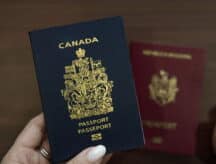Canadian Immigration Questions and Answers with Attorney David Cohen
 Every month, Attorney David Cohen will answer a few general Canadian immigration questions submitted by our readers. Here are this month’s questions and answers:
Every month, Attorney David Cohen will answer a few general Canadian immigration questions submitted by our readers. Here are this month’s questions and answers:
1. I’m an IT professional with three years’ full-time experience and want to move to Canada, but I find the initial process overwhelming. With Canada offering over 60 immigration programs, how do I find out which one(s) I may be eligible to apply for?
The good news is that it’s quite possible, as an IT professional, that you are eligible to apply for the Federal Skilled Worker Program. You would have to have at least one year of continuous full-time or equivalent paid work experience in the past 10 years in one of 50 eligible occupations, and pass a minimum threshold of language ability in either English or French.
There is a cap of 25,000 for this program, with a sub-cap of 1,000 for any one occupation, but this does not apply for applicants who:
- Qualify for Arranged Employment with a Labour Market Impact Assessment and a full-time, permanent job offer from a Canadian employer; or
- Have completed a PhD in Canada, or have completed two years of study in Canada towards a PhD, in both cases at a recognized institution. There is a cap of 500 in place for this stream.
Aside from the Federal Skilled Worker Program, there could be other economic immigration programs for which you may be eligible to apply.
2. I’m a physiotherapist from the UK looking for a Canadian employer, but am struggling to land interviews. I think my resume is holding me back, as it’s the same one I used back home. How is a Canadian resume formatted?
Your resume is key to finding employment in Canada. Employers across Canada are accustomed to seeing a candidate’s personal information and work background being presented in a particular way, so it’s important to format your resume in the Canadian style. Your resume should be presented on no more than two pages and include:
- Overall career objectives;
- Work Experience;
- Career achievements and highlights;
- Education;
- Volunteer experience, if applicable; and
- Information on professional certifications attained, if applicable.
Furthermore, this document needs to be aesthetically appealing, correctly and consistently formatted, and free of grammatical errors. It should go without saying that the information must also be 100% factually accurate. Employers and recruiters might spend just 20 seconds reading a resume, so the goal is to impress them quickly while remaining honest. The CanadaVisa Resume Builder Tool allows you to create a custom resume, which you can then use to bring your job search to the next level and land that all-important interview.
3. I’m a US citizen living in the US. My employer wants me to perform some short-term work in Canada, but I read that I might not be allowed to enter Canada because of an old DUI offence. This is the only criminal offence on my record. Will I be allowed entry to Canada? How can I improve my chances of a smooth entry at the border?
This is an issue that many people find out about too late, and they find themselves denied entry to Canada. This is known as ‘criminal inadmissibility’. While there can never be a guarantee of entry, you can definitely improve your chances of a smooth entry through rehabilitation. There are two types of rehabilitation: deemed rehabilitation and individual rehabilitation. Assuming your DUI offence is the only offence on your record, this is what you need to know:
- If more than 10 years have elapsed since the sentence was completed, you are deemed to have been rehabilitated. No application for rehabilitation is required.
- If more than five years have elapsed since the completion of the sentence, you can make an application for individual rehabilitation. This may require you to show that you are no longer a risk for criminal activity and to the Canadian public proving things such as a stable lifestyle, community ties, social and vocational skills, and that the offence was an isolated event. Bear in mind that this can be a lengthy process, and if your employer wants you to work in Canada soon you should consider applying for a Temporary Resident Permit (TRP) at the Port of Entry, which would allow you to enter Canada for a pre-determined period of time. A TRP is issued to those who would otherwise be inadmissible on criminality or health grounds.
- If less than five years have elapsed since the completion of the sentence, you may be eligible to apply for a TRP.
Simply put, your entry to Canada will depend on how much time has passed since any sentence was completed, whether the DUI offence was an isolated event, and when you wish to enter Canada.
If you would like your general immigration question to be featured in our newsletter, please email your question to QNA@CANADAVISA.COM.
If you would like to be assessed for Canadian immigration, please complete a free Canadian immigration assessment form.
© 2014 CICnews All Rights Reserved
- Do you need Canadian immigration assistance? Contact the Contact Cohen Immigration Law firm by completing our form
- Send us your feedback or your non-legal assistance questions by emailing us at media@canadavisa.com



